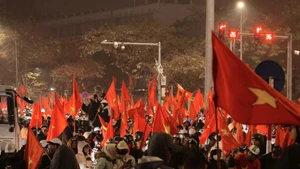Sao Paulo's Albert Einstein hospital, where Pele was undergoing treatment, said he died at 3:27 p.m. "due to multiple organ failures resulting from the progression of colon cancer associated with his previous medical condition."
"Inspiration and love marked the journey of King Pele, who peacefully passed away today," it read, adding he had "enchanted the world with his genius in sport, stopped a war, carried out social works all over the world and spread what he most believed to be the cure for all our problems: love."
Tributes poured in from across the worlds of sport, politics and popular culture for a figure who epitomized Brazil's dominance of the beautiful game.
The government of President Jair Bolsonaro, who leaves office on Sunday, declared three days of mourning, and said in a statement that Pele was "a great citizen and patriot, raising the name of Brazil wherever he went."
Bolsonaro's successor, President-elect Luiz Inacio Lula da Silva, wrote on Twitter that "few Brazilians carried the name of our country as far as he did."
French President Emmanuel Macron said Pele's legacy would live forever. "The game. The king. Eternity," Macron tweeted.
U.S. President Joe Biden said on his Twitter that Pele's rise from humble beginnings to soccer legend was a story of "what is possible."
Pele, whose given name was Edson Arantes do Nascimento, joined Santos in 1956 and turned the small coastal club into one of the most famous names in football.
In addition to a host of regional and national titles, Pele won two Copa Libertadores, the South American equivalent of the Champions League, and two Intercontinental Cups, the annual tournament held between the best teams in Europe and South America.
He took home three World Cup winner's medals, the first time as a 17-year-old in Sweden in 1958, the second in Chile four years later - even though he missed most of the tournament through injury - and the third in Mexico in 1970, when he led what is considered to be one of the greatest sides ever to play the game.
He retired from Santos in 1974 but a year later made a surprise comeback by signing a lucrative deal to join the New York Cosmos in the then nascent North American Soccer League.
In a glorious 21-year career he scored between 1,281 and 1,283 goals, depending on how matches are counted.
Pele, though, transcended soccer, like no player before or since, and he became one of the first global icons of the 20th century.
















